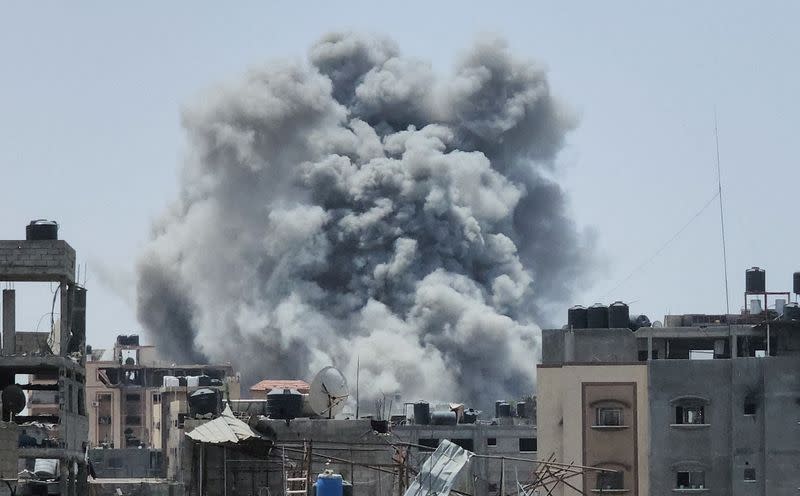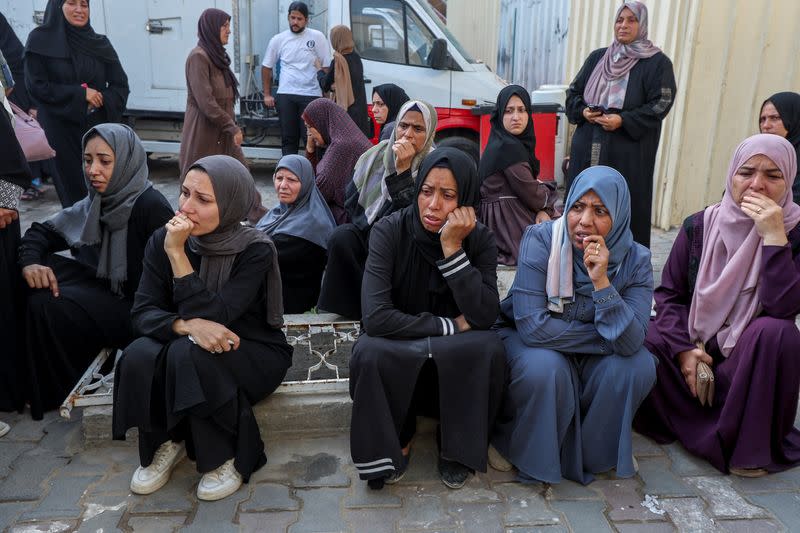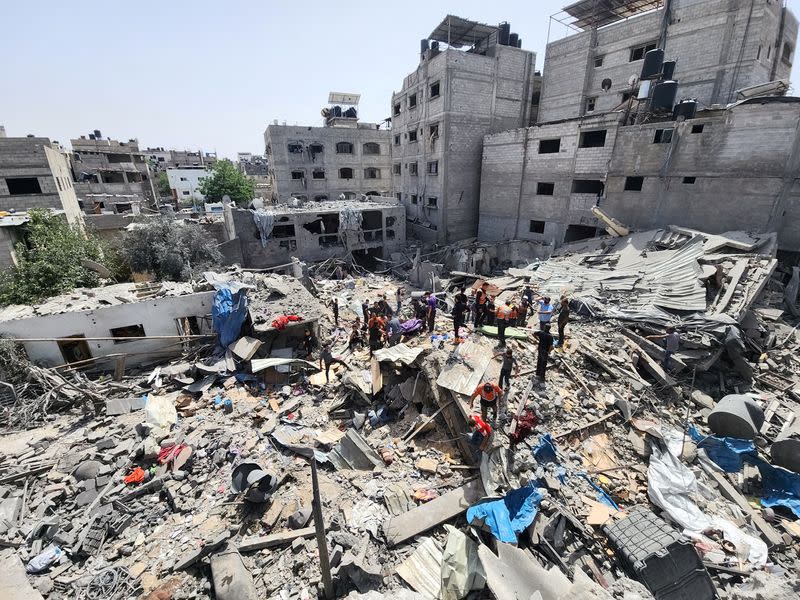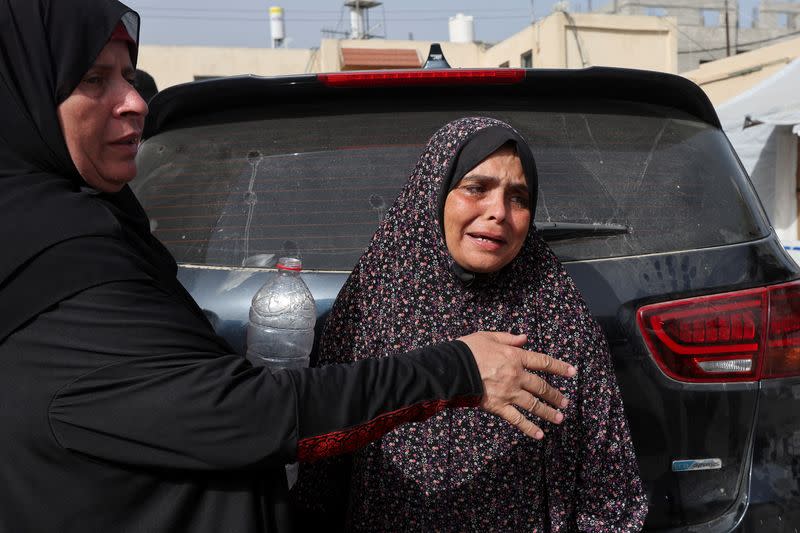Israel launches strikes across Gaza as U.S. envoy meets Netanyahu
By Nidal al-Mughrabi and Dan Williams
CAIRO/JERUSALEM (Reuters) - Israeli planes and tanks pounded areas across the Gaza Strip, residents said, as White House national security adviser Jake Sullivan met Israeli Prime Minister Benjamin Netanyahu on Sunday amid U.S. calls for a more focused military campaign.
Sullivan was expected to press for Israel to go after Hamas militants in a targeted way, not with a full-scale assault on the southern Gaza city of Rafah, the White House said before the discussions.
Israel has been pushing into the city that it says is the last bastion of Hamas forces. Hundreds of thousands of Palestinians have fled the area that was one of their few remaining places of refuge.
"Across the Gaza Strip, there is no safety," said Majid Omran who told Reuters his family had fled Rafah and just returned to what was left of their home in the southern city of Khan Younis that they had fled nearly five months ago.
"We took our children, grandchildren, and daughters and we came and lived above the rubble of our home. Because there is no place to take refuge here," Omran told Reuters inside the wrecked property as a woman cooked over a fire.
Israeli forces also pushed deeper into the narrow alleyways of Jabalia in northern Gaza overnight and into Sunday, returning to an area that they said they had cleared earlier in the conflict, residents said.
The Israeli military has said its operations in Jabalia - the largest of Gaza's eight historic refugee camps - are precise and meant to stop Hamas from reestablishing its grip there.
The Israeli military said it was "operating to identify armed terrorist cells and ... conducting dozens of strikes to assist the forces operating on the ground" in the Jabalia area.
TALKS, TUNNELS, THREATS
Ahead of Sunday's talks, an Israeli official said Prime Minister Benjamin Netanyahu and his senior aides would try to reach agreement with Sullivan about the need for press ahead with the Rafah push.
Past U.S. misgivings about the feasibility of Israel's humanitarian measures may have been allayed by the evacuation around half of the city's Palestinians in 12 days, said the official, who spoke to Reuters on condition of anonymity.
"We've shown that this is not only necessary, but doable," added the official.
The official said Israel would also air concerns about dozens of tunnels it says its forces have found under Rafah, running into next-door Egypt - which has condemned the military sweep.
"These tunnels are used by Hamas to supply itself with weapons and ammunition, and could potentially be used to smuggle out of Gaza hostages or Hamas senior operatives," Deputy Israeli State Attorney Noam Gilad said during a hearing at The Hague on Friday, in a rare detailing of allegations that Egypt's state information service previously dismissed as untrue.
Netanyahu has said the operation in Rafah, where Israel believes that as much as a quarter of Hamas' fighting forces are holed up, could be completed within weeks.
Washington worries for the hundreds of thousands of displaced Palestinians sheltering there, and has cited a need not just to evacuate them but also to ensure adequate alternative accommodation.
At least 28 Palestinians were killed on Sunday, Gaza health officials and Hamas said, most of them in a strike on a house in Nuseirat in the central Gaza Strip.
The Gaza Civil Emergency Service said in a statement rescue teams have so far recovered the bodies of 150 Palestinians killed by the army in recent days, and that 300 houses had been struck by Israeli aerial and ground fire.
The Oct. 7 Hamas assault on Israel that sparked the war killed 1,200 people, according to Israeli tallies. About 125 of the 253 people abducted in the raid are believed to remain in captivity in Gaza.
At least 35,386 Palestinians have been killed in Israeli strikes since Oct. 7, according to the enclave's health ministry. Aid agencies have warned of widespread hunger and shortages of fuel and medical supplies.
The U.S. military said on Friday trucks had started moving aid ashore from a temporary pier built by its forces, the first to reach the besieged enclave by sea in weeks.
The Popular Resistance Committee (PRC), an armed group that fights alongside Hamas in Gaza, released a statement saying the pier had been built to ease political pressure on Israel, and that any Israeli or U.S. troops on its territory would be considered a legitimate target.
On Saturday, Hamas also raised concerns about the pier, warned against any foreign military force in Gaza, but made no direct threats.
In March, when President Joe Biden announced his country's pier construction plans, he said: "No U.S. boots will be on the ground."
(This story has been corrected to fix the first name of the displaced person to 'Majid Omran' from 'Sahar Omran' in paragraph 4)
(Reporting and writing by Nidal al-Mughrabi; Additional reporting by Dan Williams in Jerusalem and Mohammed Salem in Gaza; Editing by Andrew Heavens)

 Yahoo Sport
Yahoo Sport 














































